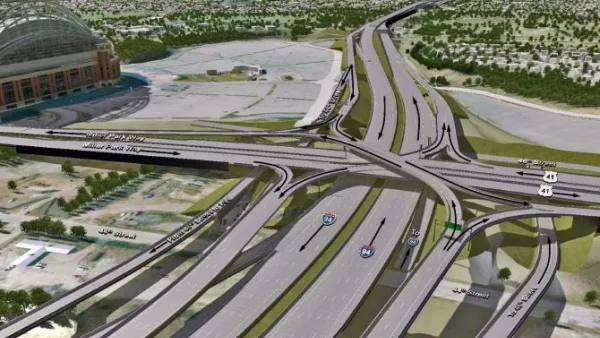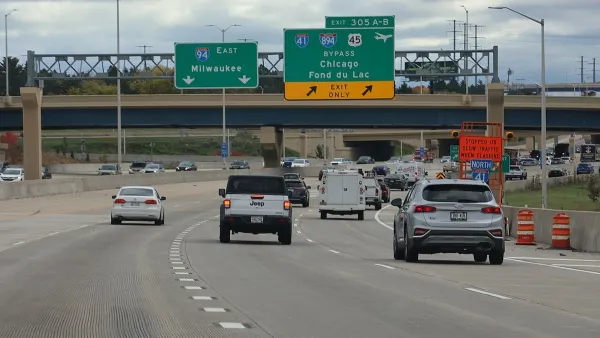Some people call it a road-building program. Others call it "an all out war on urbanism."
Michael Grunwald has produced a large, magazine-style feature for Politico's "The Agenda" series. The feature examines the city of Milwaukee's "addiction to megahighways" as an examples of a proclivity found all over the country.
Grunwald begins by describing the Marquette Interchange, completed in 2008, as the "largest and most complex road project in Wisconsin's history."
"Seven years later, though, the Marquette is no longer an outlier. The state is already building or planning three larger freeway projects in the Milwaukee area alone; the expansion and reconstruction of the nearby Zoo Interchange will cost more than twice as much as the Marquette. It’s all part of a $7 billion effort to widen and modernize the interstates around the city, an effort so massive it has its own line item in the state budget, 'Southeast Wisconsin Freeway Megaprojects.'"
The state's desire to build so many highways, at such extravagant cost, has informed some of Governor (also presidential candidate) Scott Walker's most heated political controversies, including his own party rejecting his road-building program, thus leaving the state budget in limbo, and a federal court ruling that the Wisconsin DOT used faulty projections to justify a highway widening project.
The article relates the example of Milwaukee and Wisconsin to a larger debate—fueled by the ongoing struggles of Congress to produce a long-term transportation-funding bill—about how much should be allocated for maintenance of existing infrastructure versus new construction.
Grunwald also calls on John Norquist, former mayor of Milwaukee and former president of the Congress for New urbanism, who is quoted in the article speaking bluntly about the effects of the Wisconsin road-building program. "It’s an all-out war on urbanism," says Norquist.
FULL STORY: Overpasses: A love story

National Parks Layoffs Will Cause Communities to Lose Billions
Thousands of essential park workers were laid off this week, just before the busy spring break season.

Retro-silient?: America’s First “Eco-burb,” The Woodlands Turns 50
A master-planned community north of Houston offers lessons on green infrastructure and resilient design, but falls short of its founder’s lofty affordability and walkability goals.

Delivering for America Plan Will Downgrade Mail Service in at Least 49.5 Percent of Zip Codes
Republican and Democrat lawmakers criticize the plan for its disproportionate negative impact on rural communities.

Test News Post 1
This is a summary

Test News Headline 46
Test for the image on the front page.

Balancing Bombs and Butterflies: How the National Guard Protects a Rare Species
The National Guard at Fort Indiantown Gap uses GIS technology and land management strategies to balance military training with conservation efforts, ensuring the survival of the rare eastern regal fritillary butterfly.
Urban Design for Planners 1: Software Tools
This six-course series explores essential urban design concepts using open source software and equips planners with the tools they need to participate fully in the urban design process.
Planning for Universal Design
Learn the tools for implementing Universal Design in planning regulations.
EMC Planning Group, Inc.
Planetizen
Planetizen
Mpact (formerly Rail~Volution)
Great Falls Development Authority, Inc.
HUDs Office of Policy Development and Research
NYU Wagner Graduate School of Public Service





























